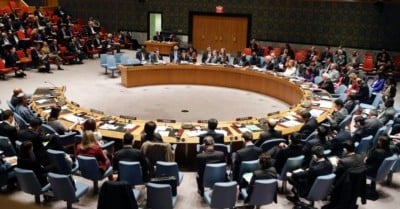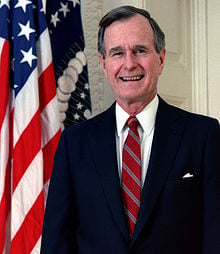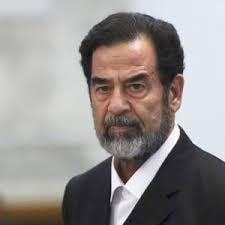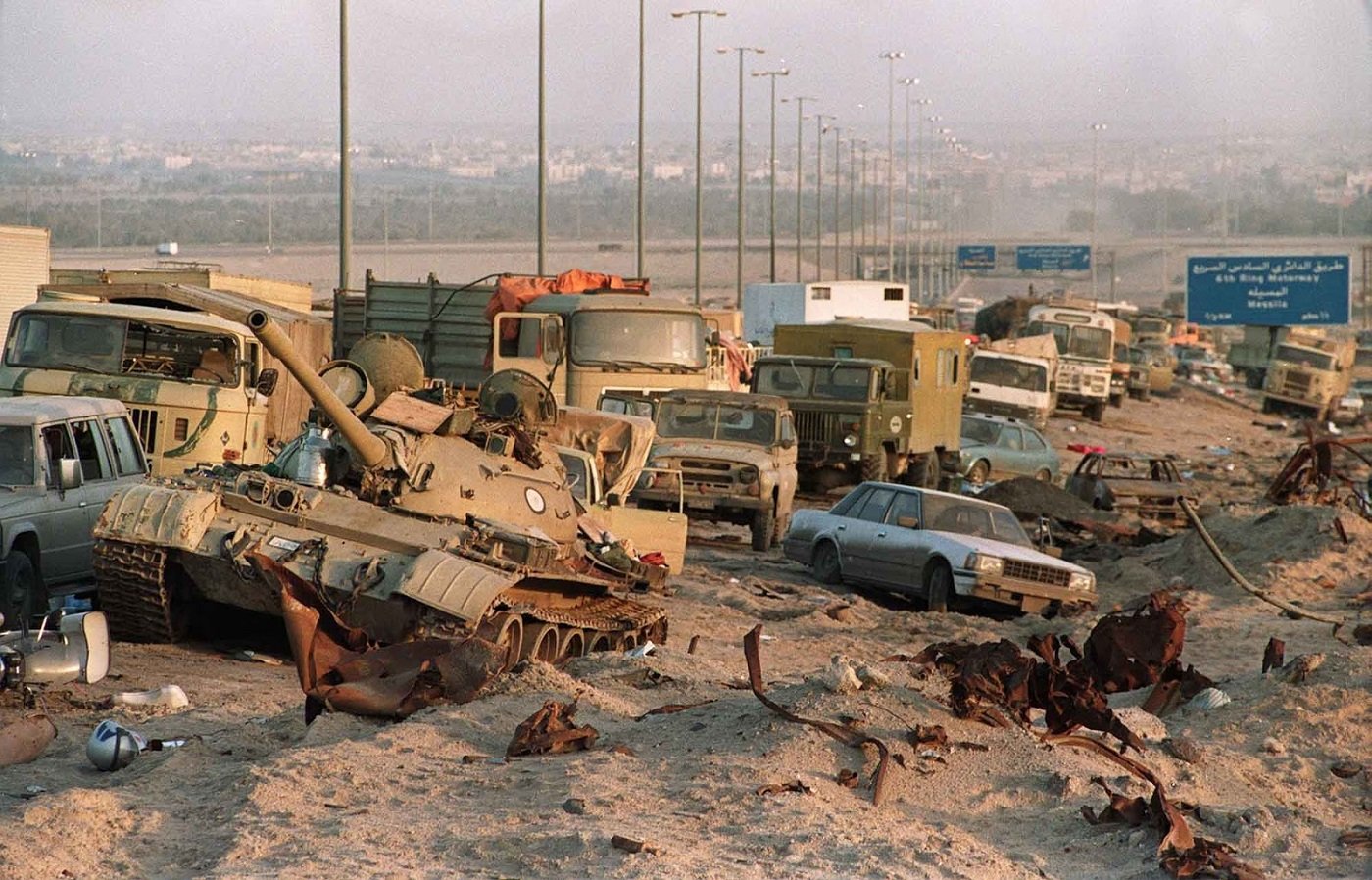Evisceration of the United Nations Security Council. A Historical Analysis. The Gulf War
Part I of a Five-Part Series

All Global Research articles can be read in 51 languages by activating the Translate Website button below the author’s name (only available in desktop version).
To receive Global Research’s Daily Newsletter (selected articles), click here.
Click the share button above to email/forward this article to your friends and colleagues. Follow us on Instagram and Twitter and subscribe to our Telegram Channel. Feel free to repost and share widely Global Research articles.
New Year Donation Drive: Global Research Is Committed to the “Unspoken Truth”
***
Introduction
The world looks on with horror, and apparent impotence, as more than 23,000 defenseless Palestinians, many of them women and children, have been killed, many more wounded since the October 7, 2023 bombing campaign by the Israeli armed forces, pulverizing Gaza, ostensibly in retaliation for the attack on Israel by Hamas on October 7, which killed approximately 1,500 Israelis.
Calls for a ceasefire from around the world are ignored, and, most shamefully of all, the United Nations Security Council, whose mandate requires it to uphold global peace and security, has, to date, remained impotent, failing to draft any resolution which would demand a cessation of the bombing; and despite the fact that United Nations workers themselves have also been killed as a consequence of the assault on Gaza, the Security Council has completely failed, as of this writing, to produce any resolutions which would halt this collective punishment of the Palestinians, which is now described as genocide.
It would be unfathomable why the UN Security Council permits this slaughter to continue, unabated; it is also unfathomable why the UN Security Council failed to demand that the Minsk Accords be complied with, which would have prevented the current prolonged war between Russia and Ukraine, and saved approximately half a million lives, slaughtered in a useless and preventable war. To make matters more scandalous were the admission by France and Germany that they never intended the Minsk Accords to be complied with, and that they cynically used the UN Security Council approval of the Minsk accords to buy time to strengthen the Ukrainian Army, for the purpose of shattering demolishing Russia.
The Historical Context
A study of the manipulation and abuse of the UN Security Council for the enactment of the geopolitical agenda of the Western powers, should begin with the 1990-1991 manipulation of the Security Council by the Western powers, just prior to the collapse of the Soviet Union, the USSR by then almost fatally weakened, and unable to withstand US/UK pressure. This study follows, including the exposure of the cynical and Machiavellian tactics used by the West to force through Security Council Resolution 678, which unleashed the pattern of slaughters for which the United Nations Security Council provided both authorization and “cover.”
An examination of overt and covert means by which Security Council approval for resolution 678 was obtained, the methods of coercion, intimidation and bribery by which Security Council members were drawn by the United States into tragic and shameful collaboration in passage of a resolution which has betrayed the very purpose for which the United Nations was originally created (“to prevent the scourge of war”) reveals the criminal and barbarous character or the “New World Order which the former Bush administration intended to impose throughout the world by the most violent means in human history.
On November 16, 1990 the Non-Aligned members of the Security Council drafted an initiative alerting the Security Council members to the risk: “Talk of war option establishes its own momentum which increases the risks of war.” The initiative states:
“1. Given the cultural gap and lack of direct, face-to-face communication between principal parties, and the overall atmosphere of suspicion, there is a high probability that any Iraqi ‘signal’ of ‘flexibility’ would either be ignored, discounted as insincere, or otherwise misinterpreted.”
“2. Given the overwhelming negative consequences now attached to withdrawal, Iraq is not likely to send a signal of flexibility that is sufficiently strong and clear to be understood until war is imminent, by which time it may be too late to stop the momentum toward war.”
Iraq’s Serious Efforts to Cooperate
 The New York Times, December 2, 1990 stated:
The New York Times, December 2, 1990 stated:
“Neither President Bush nor Secretary of State James Baker 3rd responded publicly today to Iraq’s acceptance of Mr. Bush’s offer of talks on the Gulf crisis. But Administration officials rebuffed the Iraqi Government’s suggestion that any direct talks between Iraq and the US on Kuwait should deal with the issue of a Palestinian homeland. In its statement, Iraq welcomed the chance for the two countries to have ‘a deep and serious dialogue,’ but did not make its acceptance of Mr. Bush’s offer conditional on discussion of the Palestinian issue.’”
It would be difficult to misunderstand Iraq’s eagerness for dialogue, or to deny its flexibility. On November 29, following what the New York Times described as a “smoothly orchestrated” series of Security Council meetings (“disrupted today when Cuba complained that the Council is rushing into voting a new Persian Gulf crisis resolution before it has voted on an earlier resolution criticizing Israel’s treatment of Palestinians in the occupied territories…..The United States has been striving to delay a vote on the anti-Israel resolution until after the Council gives permission for military action against Iraq, because it would like to veto the measure. Such a reminder of the United States’ friendship with Israel would embarrass Washington’s Arab friends.”) inciting the psychological atmosphere necessary for passage of Resolution 678 (the Security Council listened to descriptions of Iraqi atrocities in Kuwait for two days, all sensationally reported by the New York Times.
But interestingly, the major media failed to mention a press conference in United Nations Room 226, given by Dr. Mohammad Said, and contradicting many of the statements describing Iraqi “atrocities” “smoothly orchestrated” in the Security Council chamber.
Dr. Said’s testimony and his description of the historical circumstances and context of the Iraqi invasion were documented extensively with videotapes (he has two half-brothers and other relatives in Kuwait and Saudi Arabia) and eyewitness reports from his travels in Kuwait and Iraq: he brought a view of both Iraq and Kuwait at odds with the picture painted by the American news media “and called for both sides to pursue a rational approach to peace based on a plan put forth by the Committee of Arab-Americans Against “US intervention in the Gulf.” His testimony was ignored by both the press and the Security Council.
US/UK Machiavellian Maneuvers Making War Inevitable
The War Resolution 678 was adopted, following a campaign of manipulation akin to gangster tactics (to be described in detail, later.) And as, legally, Security Council members opposing the War Resolution 678 could have legitimately obstructed its ignominious passage by demanding a procedural vote on which issue took precedence, and should be dealt with first: in fact, S. 219331, concerning the issue of Palestine, brought before the council on October 8, 1990 legally took precedence, and massive disruption of the “smoothly orchestrated ministerial level ‘war council’” could legitimately have been caused by Security Council members outraged by the brazenly displayed double standard of 12 hastily and threateningly passed resolutions in four months, punishing Iraq for its 4 month old occupation of Kuwait, and no effective resolutions protecting Palestinians in territories “occupied” by Israel after 20 years.
And with cynicism equivalent to utter contempt (November 29, Newsday report),
“The United States agreed informally last night to allow passage of a new Security Council resolution protecting Palestinians in the Israeli-occupied territories if the measure’s sponsors don’t raise the issue and disrupt today’s historic UN vote authorizing the use of force to oust Iraq from Kuwait, according to reliable diplomatic sources. Egyptian Ambassador Amre Moussa said the United States had agreed ‘in principle’ last night not to block the measure on the occupied territories and the sponsors of the resolution promised in return that “there won’t be any ‘show biz’ during today’s council meeting on Iraq and Kuwait.”
The Non-Aligned honored their agreement and the “War Resolution 678” passed without disruption or complication, or the disgrace that the Non-Aligned could have legitimately heaped upon the United States and it Foreign Ministerial collaborators. (In fact, a senior US official told an AP correspondent that the Non-Aligned would have “every reason to feel betrayed if they didn’t get cooperation on S/21933/Rev.1”).
The Famous / Infamous BBC “Leak”
On December 5, a resolution approved by the Permanent Five, including the United States Mission, and the Non-Aligned was drafted and scheduled for Security Council vote, as promised by the United States Mission, and the Non-Aligned was drafted and scheduled for Security Council vote, as promised by the United States, and would have, crucially, also met Iraq’s request for conditions enabling it to immediately and honorably withdraw from Kuwait, thereby averting a devastating war. “Interestingly,” the resolution, (acceptable to all, including, crucially, Iraq, and guaranteeing a peaceful solution) was “leaked” the evening of December 5 to a BBC reporter by “several of the usual reliable US diplomatic sources,” and immediately broadcast by the BBC as an “important shift in US” policy since “as part of negotiations on this resolution the Americans were proposing a reference in the Security Council resolution to a Middle East peace conference; this was the first time such a conference was mentioned in connection with the Security Council, and would be binding, implying further action of the kind Israel wouldn’t like.”
The premature BBC leak spotlighting the peace conference “caused (more accurately, enabled) Bush to immediately reject the “peace resolution,” and it was squashed. Though the BBC correspondent stated disingenuously that “this kind of proposal would have to have a green light from Washington”’ if it already did, the BBC “leak” relieved, and allowed Bush to “back off” from support for a resolution his administration never intended to support from the outset, though the US mission could appear to support it initially until the cooperative BBC “leak” enabled Washington to obstruct the “peace resolution” from coming to a vote at the Security Council, at which point the US would have vetoed it, exposing its own double standard. (Washington once stated: “it is not opposed to leaks, it simply wants to control them.”) Had the resolution passed, it might have offered protection to Palestinian civilians, and led to Iraq’s withdrawal from Kuwait, clearly something Washington and its British lackeys in cynical collaboration intended to prevent.
Cynical US/UK Postponements of Vote on Peace Restoration, Malaysia Protest Deception
Nevertheless, this cowardly and dishonorable ploy did not go unnoticed by many Ambassadors at the UN, accustomed to US conniving methods of interference in the domestic affairs of other countries: privately a majority of Ambassadors at the UN referred with disgust to the so-called “leak,” but they lacked a voice on the Security Council. Meanwhile, back at the Security Council events developed in an even more odious and disgraceful fashion: the meeting at the Security Council, scheduled for the afternoon on December 6, and at which the Non-Aligned Resolution S/21933.Rev.2 on Palestine should have been brought to a vote at the Security Council with US support, as promised on November 28, was then shifted to Friday morning, then to Friday evening, then to Saturday evening. On December 8, 1990, the Soviet Ambassador moved for postponement till December 10 (to spare the US the embarrassment of vetoing Res. 21933/Rev.2: Ambassador Razalli of Malaysia stated:
“I appeal to members of the Council to understand what the request for a postponement is all about. It is not to work towards a different formulation of paragraph 7; it is to work towards the exclusion of paragraph 7, which calls for the convening of an internal peace conference on the Middle East, in the interest of the position of an important member of the Council.”
Nevertheless, the meeting was postponed. At 3PM December 10, the Soviet Ambassador again moved the adjourn the meeting to Wednesday, December 12 at 6PM (again sparing the US the embarrassment of vetoing the Resolution and exposing its own double standards). The Representative of Malaysia again protested:
“For the record, too, let me say that the sponsors have made the maximum concession on the international conference. We have offered, in what may be called ‘Revision 3,’ if ever that revision clears the surface, to transpose paragraph 7 into the preamble and what is in the preamble into the operative part; this is a maximum concession that in many ways diluted many things on the matter of the international conference.”
To no avail, the meeting was adjourned until December 12 at 6PM. On December 12, the Deputy Ambassador of the Soviet Union proposed adjournment of the meeting to Monday, December 17 at 3PM. Outside the Security Council chambers, Mr. Al Kidwah, the representative of Palestine stated unequivocally that
“it is the USA that is blocking and ultimately preventing any action toward a peaceful and equitable solution of the Palestinian and the entire Middle East crisis.”
When challenged that it was the USSR that had moved to postpone the meetings, Al Kidwah lucidly reaffirmed that it is the USA that is fundamentally responsible for the deadlock, implying that other members were serving the US interest in masking its role, and not too nakedly revealing its duplicitous double-standard.
Stupefaction and disbelief, followed by tension, frustration, rage and despair were shared by Asian, African, Latin American and Middle Eastern diplomats as well as others observing the vulgar and contemptuous methods of the USA, its British and European lackeys, and a collaborative, emasculated USSR, of manipulating and paralyzing any Security Council action protecting Palestinian citizens in the “occupied territories” and ultimately sabotaging effective action toward a peaceful resolution of the crisis in the Middle East. And the extent to which the USA dishonored itself, betrayed its promise of November 28, and succeeded in manipulating the Security Council and the United Nations to serve its own “interest” in instigating the Gulf War was staggering.
Highjacking of the United Nations Security Council by US Dominated Western Powers
The formal meeting scheduled for December 17, 3PM did not occur. Evidently a “long epic informal meeting” (as described by the Representative of Malaysia on December 19) served to further delay serious efforts to resolve the crisis – peacefully, and when on Wednesday, December 19 at 11:55 AM a formal meeting was convened, Finland moved for further postponement – implicitly to enforce a further dilution o S/21933/Rev.3 which would ultimately result in castration of the resolution, thereby serving the USA’s intransigent, obsessive and virtually fanatic insistence that nothing even remotely suggesting that the crucial problems of the Middle East might have some common basis (that suggestion of “linkage,” a word which attained the status of a taboo throughout these negotiations) survive, as Finland thereby insured protection of the “interests” of a tiny ‘elite,’ the Ruling Class in the USA which succeeded in using the entire United Nations apparatus to impose and inflice its own interes upon the entire planet.
The War: UN Security Council Resolution 678: Pulverizing Iraq
 And while epithets were hurled at Saddam Hussein throughout this period, references to him as a “madman, another Hitler, etc., the US delegation’s panic at any suggestion of the work “linkage” verged on psychosis, causing any impartial observer to wonder who was in fact the madman, and whether Iraq’s invasion of Kuwait was being used by the USA in precisely the same manner as Hitler used the burning of the Reichstag to justify all his ultimately genocidal actions. Unfortunately, George H. W. Bush’s statement almost 4 weeks later (as on January 16, 1991 the US began bombing Iraq in what was to become the most “intensive bombing campaign in the history of warfare”) (New York Times, January 23, 1991, p.8…. described, as follows by an Egyptian refugee:
And while epithets were hurled at Saddam Hussein throughout this period, references to him as a “madman, another Hitler, etc., the US delegation’s panic at any suggestion of the work “linkage” verged on psychosis, causing any impartial observer to wonder who was in fact the madman, and whether Iraq’s invasion of Kuwait was being used by the USA in precisely the same manner as Hitler used the burning of the Reichstag to justify all his ultimately genocidal actions. Unfortunately, George H. W. Bush’s statement almost 4 weeks later (as on January 16, 1991 the US began bombing Iraq in what was to become the most “intensive bombing campaign in the history of warfare”) (New York Times, January 23, 1991, p.8…. described, as follows by an Egyptian refugee:
“They are bombing; people are dying in the street,” said Mr. Mohammed, the auto mechanic. “This is not war, it is the annihilation of a people, an entire Muslim people. People are sleeping in the Mosques. Soldiers are dead in the streets with no one to evacuate them.
This is a black day.”) was conclusive proof that Iraq’s invasion of Kuwait was indeed Washington’s Reischstag, as George Bush stated before the world that the goal of the bombing was to destroy Iraq’s nuclear and chemical industries and to eliminate Hussein from power. (This despite UNDPI International Atomic Energy Agency/1154 stating “no change has taken place in the status of nuclear material under safeguards in Iraq since the last inspections”…April, 1990. At that time, the conclusion was reached that all nuclear material under safeguard was accounted for.)
According to Felicity Arbuthnot:
“The US having refused all negotiation, then dispatched an extra three hundred and sixty thousand US troops to the Gulf at the end of November, the UN Security Council passed UNSCR 678, threatening force of Iraq did not withdraw by January 15th – Iraq having offered to withdraw, albeit with conditions on August 12th., and without conditions a short time later.
In Geneva, on 9th January 1991, then Secretary of State James Baker (a “diplomat” who stated: “We will reduce Iraq to a pre-industrial age”) met Iraq’s Foreign Minister, Tareq Aziz, with a letter from Bush Snr., promising the destruction of Iraq, if Kuwait was not withdrawn from by 15th January. Tareq Aziz stated he would not deliver the letter.
Expansion of the Attack on Iraq: In Violation of UN Security Council Mandate
The New York Times, January 21, 1991:
“The Bush Administration is taking advantage of combat in the Persian Gulf to try to achieve military aims that go beyond an Iraqi withdrawal from Kuwait:…The process began from the moment President Bush announced the onset of war and said the US would destroy Iraq’s nuclear and chemical industries. That was not envisioned in the 12 United Nations Resolutions on Kuwait, but that was an objective that was certainly on the lists of American officials who had been looking for ways to neutralize Iraq as a regional power. The United Nations resolutions on Kuwait never mentioned Iraq’s nuclear potential. But announcing the start of hostilities permitted Mr. Bush to say explicitly that he intended to destroy the chemical and nuclear potentials of Iraq…The US continues to say that it is not trying to kill Mr. Hussein, but it has made no secret of its hope that he would fall from power as a result of the war.” (New York Times, January 22, 1991)
Yes, United States’ will prevailed, with the collaboration of Finland, and of course the meeting was postponed to December 20, 1990, at which point the US had bludgeoned the entire Security Council into submission, the diluted “offending preambular paragraph in S/21922/Rev.3” was entirely eliminated and replaced by a Presidential Statement (not legally binding, as a Security Council Resolution including the paragraph would have been) which was virtually meaningless, in any case, stating:
“In this context they agree that an international conference, at an appropriate time, properly structured, should facilitate efforts to achieve a negotiated settlement and lasting peace in the Arab-Israeli conflict.’ “However, the members of the council are of the view that there is not unanimity as to when would be the appropriate time for such a conference. In the view of the members of the council, the Arab-Israeli conflict is important and unique and must be addressed independently, on its own merits.”
The only voice of sanity (reminiscent of the boy in “The Emperor’s New Clothes” who stated, in opposition to the totally deluded consensus on the exquisite finery of the Emperor’s new clothes, that the Emperor was, in fact, naked) was expressed by Yemen’s Ambassador Al-Ashtal:
“Since there has been much recent talk of linkage between the Gulf crisis and the problem of the Middle East, I should like in conclusion to recount a brief folk tale that may portray the overall situation with regard to this problem. The story – which by the way is an old Chinese proverb – goes as follows: A farmer had some silver coins and wanted to hide them somewhere. He therefore dug up a small hole in his orchard and buried the coins in it. He then put up a sign reading: ‘There are no silver coins buried here.’ The moral of that terse little tale is that the more we affirm that there is no linkage between the Gulf crisis and the Middle East problem, the more we highlight that link.”
Under the circumstances, it is doubtful whether the BBC would have been severely reprimanded for its “leak” that entirely disrupted negotiations toward a peaceful settlement of the Gulf crisis. All evidence leads toward the BBC “leak” as part of a “smoothly orchestrated” inexorable and deadly “legal” preparation for a war that has revealed its perpetrators, the “coalition” architects as genocidal and barbarous was criminals.
*
Note to readers: Please click the share button above. Follow us on Instagram and Twitter and subscribe to our Telegram Channel. Feel free to repost and share widely Global Research articles.
Carla Stea is a Research Associate of the Centre for Research on Globalization (CRG) and Global Research’s Correspondent at UN headquarters, New York.



